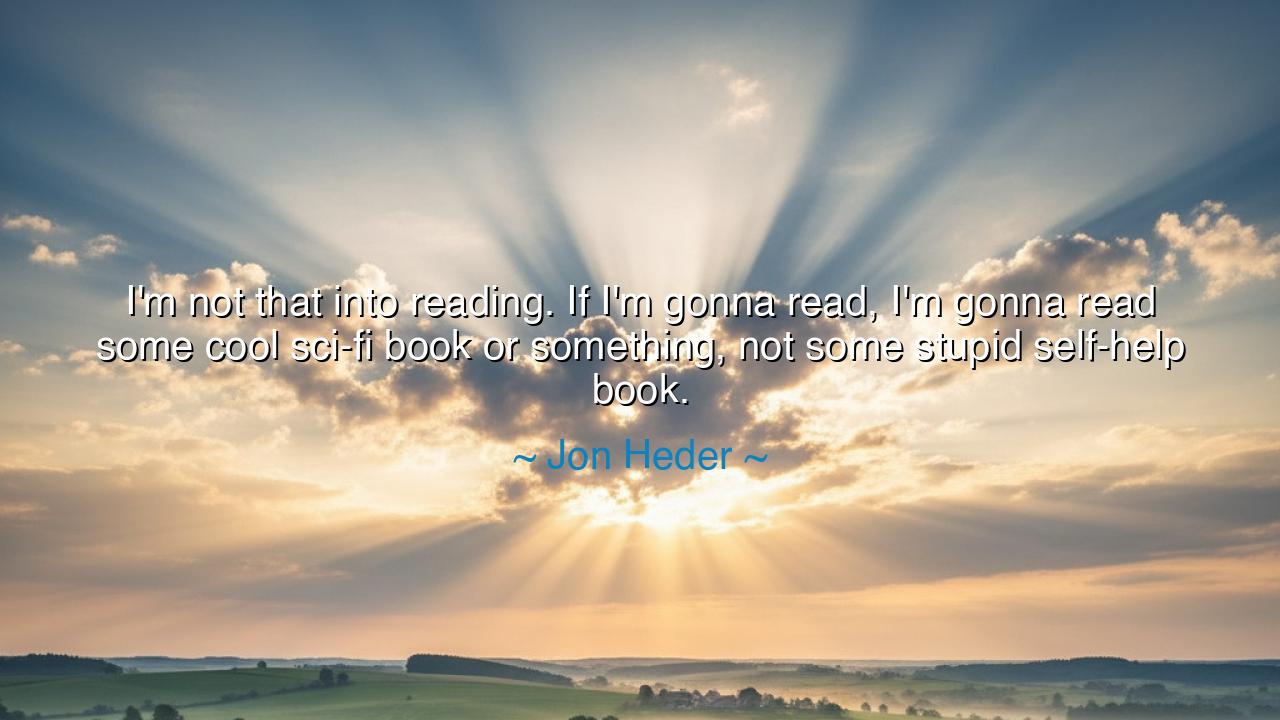
I'm not that into reading. If I'm gonna read, I'm gonna read some
I'm not that into reading. If I'm gonna read, I'm gonna read some cool sci-fi book or something, not some stupid self-help book.






In the tapestry of human growth and knowledge, there is a recurring debate over the source and nature of wisdom. Jon Heder’s words, “I’m not that into reading. If I’m gonna read, I’m gonna read some cool sci-fi book or something, not some stupid self-help book,” reflect an ancient and modern truth: that knowledge is not a singular, rigid thing, but a dynamic force that can be channeled in many ways. To Heder, the value of reading lies not in the traditional or prescribed paths of self-improvement, but in the adventure and imagination that science fiction offers. This perspective speaks to a deeper truth about humanity: that while wisdom can be sought in many forms, the path to enlightenment is unique to each individual, and the tools we choose to use to sharpen our minds and spirits are just as personal.
In the ancient world, the pursuit of knowledge was often seen as a grand and heroic endeavor. The Greek philosophers knew that learning could take many forms—some intellectual, others mystical, and some physical. Yet, the greatest minds, from Plato to Aristotle, understood that wisdom did not simply reside in books or prescribed teachings; it was discovered through lived experience, through contemplation, and through interaction with the world. Plato’s Academy encouraged not just the study of classical texts but dialogue—the exchange of ideas and the questioning of truth. Similarly, in Heder’s words, there is a nod to the adventurous nature of learning. Just as the ancient philosophers explored different realms of thought, Heder embraces the genre of sci-fi, a genre that pushes the boundaries of what we know, challenging the intellect in its own right.
This is where the tension between self-help books and sci-fi arises. The former, as Heder describes them, are seen by many as prescriptive, offering rigid rules or guidelines that promise to solve the complexities of life. But to the thoughtful observer, these books may seem limited, even over-simplified in their approach to humanity’s vastness. Self-help books, though well-intentioned, often fail to capture the essence of the human experience—that which is layered with contradictions, emotions, and unpredictability. It is for this reason that fiction, especially genres like sci-fi, has been valued for centuries—it allows the mind to wander freely, to explore possibilities that transcend the limitations of everyday life. Through imagination, we begin to see a more expansive view of the world and our place in it.
Consider the great visionaries of the past, such as Isaac Newton, whose mind delved into the deep mysteries of the universe, yet was inspired by ideas often derived from science fiction of his time. Or Jules Verne, whose imaginative tales of space and sea travel laid the groundwork for many of the technological marvels that followed. These men, in their way, were challenging the boundaries of human knowledge, much as Heder suggests that sci-fi does. These works encouraged us to think beyond the mundane and the immediate, sparking our collective imagination to move beyond the present and into realms of possibility. Science fiction, like the works of Verne or Arthur C. Clarke, encourages the reader to look toward the future, to dream, and to imagine what might be, rather than merely reflecting on what is.
Yet, Heder’s dismissal of self-help books brings an important point into the light: true wisdom, like the ancient oracles, is found not in passive learning, but in the active pursuit of understanding. To immerse oneself in sci-fi or to wander through the imaginative worlds it creates is to engage with a different kind of wisdom—one that does not seek to provide quick solutions but rather asks deep, often difficult questions. Sci-fi pushes the boundaries of thought and challenges our understanding of humanity’s role in the cosmos, offering a more holistic, expansive view of the self. It is an exploration of the infinite, whereas self-help books often restrict themselves to narrow solutions, formulaic steps that aim to solve specific problems.
Thus, the lesson to be learned is this: we must not dismiss any form of learning too quickly, but rather approach it with discernment. Books—whether self-help, sci-fi, or philosophical texts—are tools for growth, but they must be used with intention. The world is rich with wisdom, but it is our responsibility to seek out the sources that speak to us most deeply, that expand our minds and souls in ways that resonate with our own journey. Like Heder, who finds excitement in the boundless creativity of science fiction, we must seek out that which sparks our curiosity and expands our understanding.
Let this be our guide: do not be confined by the expectations of what you should read or the paths others lay before you. Explore the realms of imagination, art, and discovery, for in those spaces, you may find the answers you seek. And in doing so, cultivate a life of learning, one that encourages growth, exploration, and the discovery of truths, not just within books but within ourselves and the world we inhabit. Wisdom is not a one-size-fits-all garment; it is something each of us must tailor, using the materials that resonate with our own lives.






AAdministratorAdministrator
Welcome, honored guests. Please leave a comment, we will respond soon